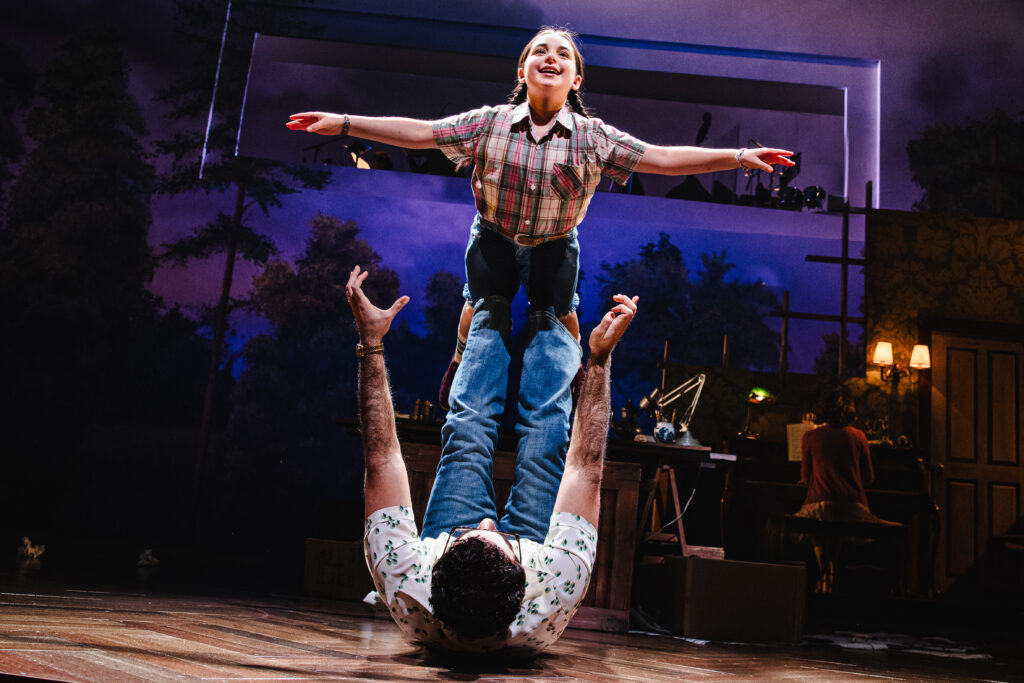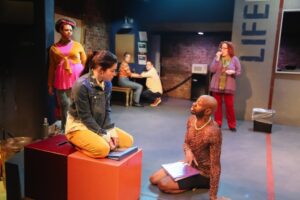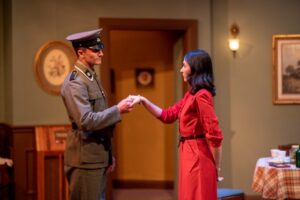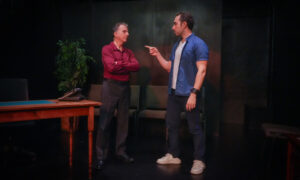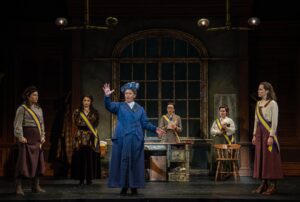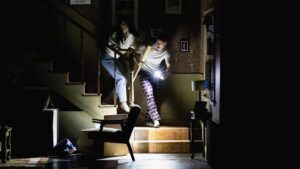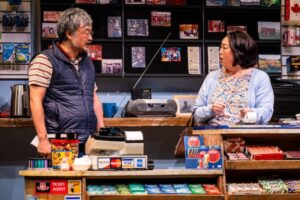It’s a brisk New England autumn night, and the audience pulls on coats as they exit the theater. An elegant, white-haired gentleman is still weeping (decorously, this is Boston) in the aisle, his Burberry over an arm as he wipes his eyes. Fun Home ( Based on the graphic novel by Alison Bechdel) has that effect despite Jeanine Tesori’s award-winning score, Lisa Kron’s strategically droll lyrics and two crowd-thrilling production numbers executed exclusively and flawlessly by three kids. The play has that effect because everyone has parents or parental figures against whose always-mysterious adult lives we measure our own. And it never works. It isn’t supposed to.
At opening, Alison Bechdel {Sarah Bockel}, the popular lesbian cartoonist, is at her foolscap-strewn desk trying to capture in inky frames the story of her relationship with her father, Bruce Bechdel (Nick Duckart.) He was (note tense) a high school English teacher, proprietor of a small-town Pennsylvania funeral home and an avid restorer of 19th century interiors. He was also, we soon learn, a married and closeted gay man who committed suicide scant months after college-age Alison told her parents she’s a lesbian.
As the 43-year-old Alison calls out, “Caption,” (“My father and I were alike. My father and I were nothing alike.”), Small Alison (Lyla Randell) in bibbed denim overalls begs her daddy to “play airplane,” and he complies. He picks her up and holds her above his head, in her own world. The flying motif will be reprised in the final song and is probably the only possible response to Bechdel’s initial question. No, they are not alike. They are parent and child, their realities forever disparate and impermeable but nonetheless deeply linked.
The play’s structure, a not-sequential series of scenes arising from the adult Bechdel’s struggle to frame a family history in cartoons, is as jumbled and complex as real thought. We see her childhood as Small Alison, her college-age adolescence as Medium Alison and the adult Alison observing and trying to make sense of it all. Conformity, silent and tyrannical, rules the household in “Welcome To Our House On Maple Avenue” where everything must be as “he wants” and “like chaos never happens if it’s never seen.” Jennifer Ellis as the wife/mother, Helen, wonderfully embodies the tense and broken spirit of a woman trapped by culture and responsibility in an empty marriage. Her solo near the end, “Days and Days,” is crushingly accurate and bleak. Yet the kids, Small Alison, Christian and John (Lyla Randall, Odin Vega and Caleb Levin) exist apart from the family secret, naturally at one with the zeitgeist. Their early Michael Jacksonish “Come To the Fun Home” number in the casket sales room brought the house down with its skill and humor, especially that of puckish, savvy little Randall.
But what of Bruce Bechdel, the troubled and troubling character his daughter struggles to grasp? Duckart’s Bruce is quixotic, at times nurturing, at times angry and frightening. He’s a bit intellectual, sending Medium Alison at college Colette’s autobiography, perhaps suggesting that he’s aware of her conflict over her sexual identity. He seduces young men (all played by Wyatt Anton), one possibly his student, making him distasteful (to some audience members.) He’s deeply involved in 19th century architectural and interior design restoration, and Tanya Orellana’s captivating set reflects a world of scrupulous care and beauty he values. Magnificent bookcases, mirrors and a panel of Art Deco stained glass emerge and vanish, ending with the blinding onrush of 18-wheeler headlights beneath which he chose to die.
But why? Medium Alison’s (Maya Jacobson) first sexual experience with a woman, Joan (Sushma Saha) in college, is played with sort of cringy (to this lesbian reviewer), semi-slapstick humor jarringly at odds with the suicide of a parent because of it. Adult Alison throws a sheet over Medium Alison (Jacobson) and Joan (Saha) as they athletically bounce around unseen to audience chuckles. The scene as a reflection of gay identity hardly merited a MAGA gag reflex, much less a profound parental reaction. And maybe that was the point, that sex observed is routinely silly so IT cannot have been responsible for Bruce’s suicide?
Director Logan Ellis’s choice to recreate Small Alison’s childhood glimpse of an old-school butch lesbian (“Ring of Keys” in which the little girl wonderingly sings, “I know you.”) in first-lover Joan, was intriguing. Saha, bare-midriffed in low-rise pants sporting the iconic butch key ring that’s also the collectible show pin for Fun Home, was the ghost of Small Alison’s classic butch in a song that’s sung long after she appears with Medium Alison as Joan. A delicious and haunting riff for audience members familiar with the graphic novel.
But it’s Adult Alison’s (Bockel) “Telephone Wires” near the end that frames a difficult truth worth crying over. She’ll return to Oberlin in the morning, and an impromptu drive with Bruce is her last chance to talk. He suggests they head to a gay bar, but she says, “I’m not twenty-one,” reifying a difference that grows insurmountable as she measures their time by stop lights and telephone wires. Bockel skillfully embodies Medium Alison’s desperation to ask the impossible questions. She liked jeans and t-shirts, not frilly dresses, as a child. Did he know? They’re both gay, but are they actually alike? Duckart’s Bruce doesn’t answer, but instead remembers a boy he loved long ago, names the boy, wonders where he is now. He looks straight ahead, lost in himself. Three months later he will step into the path of a speeding semi and two decades later Alison will draft a graphic novel that can reveal no more than their conversation in the car. We, especially to those closest to us, remain inscrutable, inaccessible. Except maybe in fleeting, inchoate moments of love, remembered.
Fun Home’s musical finale, “Flying Away,” dreams of a space or time in which all are free to have and cherish those moments. All musicals must end in this way. But the gentleman in the aisle with his Burberry, wiping his tears on the way out, is what Fun Home is about.
Huntington Theatre, 264 Huntington Ave., Boston, MA, 02115, November 19 – December 14, 617-266-0800
tickets@huntingtontheatre.org

